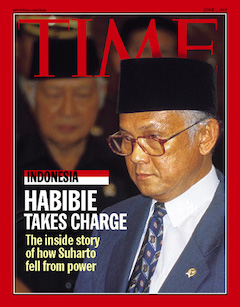
Bacharuddin Jusuf Habibie (1936-2019, age 83). Often referred to as B.J. Habibie, was an Indonesian engineer, politician, and the third President of Indonesia (1998–1999). A close ally of longtime leader Suharto, Habibie played a pivotal role in Indonesia’s democratic transition following the 1998 Reformasi movement. [Luce Index™ score: 75/100]

Trained as an aerospace engineer in Germany, he was instrumental in developing Indonesia’s aviation and technology sectors. His brief presidency focused on political reforms, economic stabilization, and East Timor’s independence referendum.
Early Life and Education
Born in Parepare, South Sulawesi, Habibie studied aerospace engineering at the RWTH Aachen University in West Germany, earning his doctorate in 1965.
He later worked at Messerschmitt-Bölkow-Blohm, a German aircraft manufacturer, where he contributed to advanced aviation projects.
Political Career
Recruited by Suharto in 1974, Habibie returned to Indonesia to lead the country’s industrial development. He served as Minister of Research and Technology for two decades and was appointed Vice President in 1998.
Following Suharto’s resignation amid mass protests, Habibie assumed the presidency. His administration introduced key democratic reforms, including press freedom and multiparty elections, though his decision to allow an East Timor independence vote drew controversy.
Legacy
After leaving office, Habibie remained influential in Indonesian politics and continued advocating for technological advancement. He authored several books on governance and development. His life was dramatized in the 2019 biopic “Habibie & Ainun,” highlighting his marriage to Hasri Ainun Habibie.